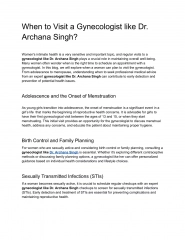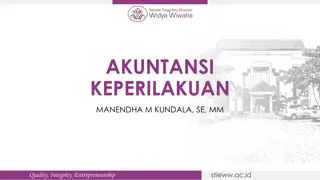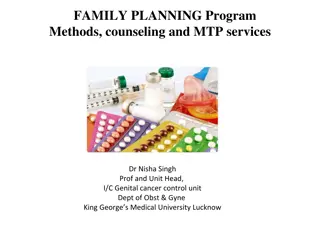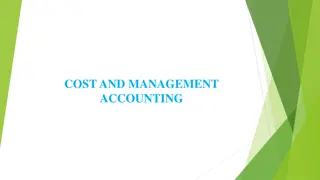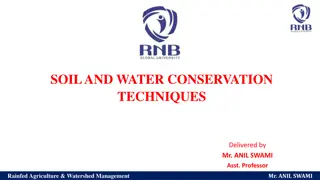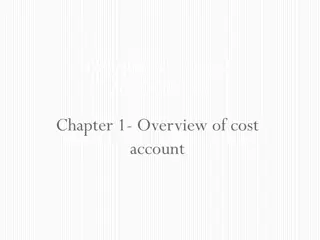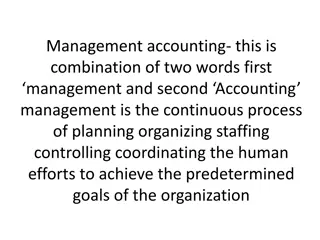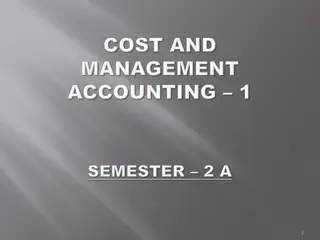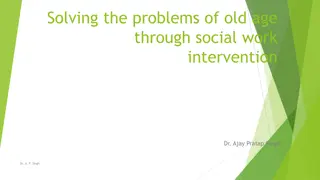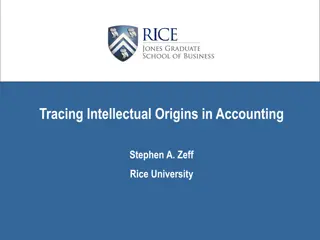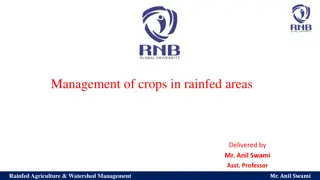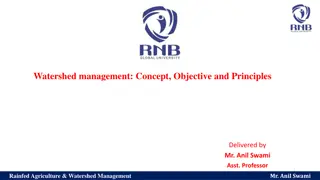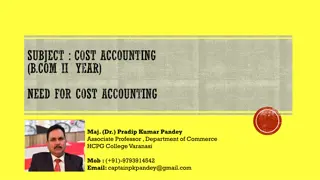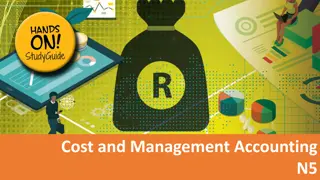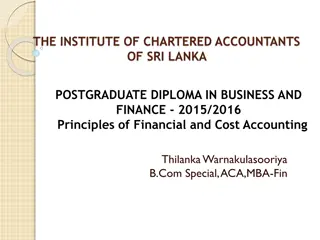
Accounting, Planning, and Control in Business Operations
Explore the syllabus covering budgeting, capital budgeting, variance analysis, marginal costing, responsibility accounting, and inventory control under the guidance of Dr. Anil Pratap Singh. Understand the significance of accounting, planning, and control in managing economic entities effectively.
Download Presentation

Please find below an Image/Link to download the presentation.
The content on the website is provided AS IS for your information and personal use only. It may not be sold, licensed, or shared on other websites without obtaining consent from the author. If you encounter any issues during the download, it is possible that the publisher has removed the file from their server.
You are allowed to download the files provided on this website for personal or commercial use, subject to the condition that they are used lawfully. All files are the property of their respective owners.
The content on the website is provided AS IS for your information and personal use only. It may not be sold, licensed, or shared on other websites without obtaining consent from the author.
E N D
Presentation Transcript
1 DR.ANIL PRATAP SINGH HOD COMMERCE HARISH CHANDRA POST GRADUATE COLLEGE VARANASI ANIL PRATAP SINGH Friday, April 4, 2025
PART I ACCOUNTING FOR PLANNING AND CONTROL M.COM. III SEM. 2 SYLLABUS ANIL PRATAP SINGH Friday, April 4, 2025
OBJECTIVE OF THIS PAPER :- The objective of this course is to Familiarize students with the accounting concepts and methods used by managers for Planning and controlling business operations. 3 syllabus Unit I Budgeting Control: Meaning of Budget and Budgeting control, purposes of Budgeting, Importance, Essentials of an effective budget, classification of budgets Flexible budget and ZBB Capital Budgeting: meaning and Appraisal-Pay back period, method, Rate of return method and net present value method. Unit II Standard Casting and Variance analysis:- meaning and objectives of Standard Costing Setting of Standard, Variance Analysis:- Material, Labour and Overhead variances Unit III Marginal Casting:- meaning, Determination of Profit under marginal Costing, Importance and Applications:- Dropping a line or product or Department, Pricing of Product, make or by Decision, Selection of most profitable channel, Break even analysis:- Meaning, P/V ratios, BEP Chart and Practical Applications of Break even Analysis Unit IV Responsibility Accounting:-Meaning and Advantages, Responsibility Centers Cost, Profit and Investment Centers. Transfer Pricing- Meaning, Methods and Selection of Transfer Pricing Method. Inventory Contro.Meaning,Importance and Techniques(EOQ,ROP,ABC,VED)andDetermination of Inventory levels. ANIL PRATAP SINGH Friday, April 4, 2025
INTRODUCTION 4 Name of this paper is related with three words ACCOUNTING,PLANNING AND CONTROL. Before discussing the paper content according to syllabus I would like to discuss these three words which you guys know very well.These words are familiar with all B.COM.pass students but I feel that this is necessary to explain these words in brief here and then discuss the paper according to syllabus. ANIL PRATAP SINGH Friday, April 4, 2025
ACCOUNTING 5 Accounting is the measurement, processing and communication of financial and non financial information about economic entities such as business and corporation. Accounting, which has been called the language of business, measures the result of an organisation s economic activities and convey this information to a variety of users including investors, creditors, management and regulators. Accounting can be divided in to several fields including Financial Accounting, Management Accounting, External Auditing, Tax Accounting and Cost Accounting. ANIL PRATAP SINGH Friday, April 4, 2025
PLANNING 6 Planning is deciding in advance what is to be done.It involves the selection of objectives,policies,procedures and programs from am ong alternatives. M.E.HURL Planning involves the determination of future course of action,that is, why an action,what is to be done,how to be done and when to be done. ANIL PRATAP SINGH Friday, April 4, 2025
PLANNING 7 Planning is the process of thinking about the activities required to achieve a desired goal. It is the first and foremost activity to achieve desired results. It involves the creation and maintenance of a plan, such as psychological aspects that require conceptual skills. Planning is preparing a sequence of action steps to achieve some specific goal. If a person does it effectively, they can reduce much the necessary time and efforts of achieving the goal. A plan is like a map. When following a plan, a person can see how much they have progressed towards their project goal and how far they are from their destination. Planning is one of the executive function of the brain, encompassing the neurological process involved in the formulation, evaluation and selection of a sequence of thoughts and actions to achieve a desired goal. ANIL PRATAP SINGH Friday, April 4, 2025
8 GOAL ORIENTED DYNAMIC PROCESS FORWARD LOOKING NATURE OF PLANNING INTELLECTUAL PROCESS INVOLVES CHOICE PRIMARY FUNCTION ANIL PRATAP SINGH Friday, April 4, 2025
Better checks and control of organisation. Sustained growth and profitability Superior assessment of performance. 9 Benifits Optimum utilisation of resources. Development of strategy to meet objectives. Timely remedy for action Of Identification of possible areas of development Improvement of managerial performance Planning ANIL PRATAP SINGH Friday, April 4, 2025
Limitations of planning 10 Lack of accurate information Failure of people Problems of change Inflexibilities Rigidity in planning Time and cost factors Environmental constraints ANIL PRATAP SINGH Friday, April 4, 2025
CONTROLLING 11 Controlling is determining what is being accomplished, that is evaluating the performance and if necessary, applying corrected measures so that the performance takes place according to plans. George R Terry. In the planning stage,managers decide how the resources would be utilised to achieve organisational objective; at the controlling stage, managers try to visualise whether resources are utilised in the same way as planned. ANIL PRATAP SINGH Friday, April 4, 2025
Controlling means ensuring that the organisation is actually achieving the planned objectives. 12 Is the process of comparing actual performance with standards and taking any necessary corrective actions . Is the pocess of monitoring activities to ensure that they are being accomplished as planned and of correcting any significant deviation. ANIL PRATAP SINGH Friday, April 4, 2025
Step1 Establish performance objectives and standards 13 The Control Process Step 2 Measure actual performance Step 4 Take necessary actions Step 3 Compare actual performance with objectives and standads ANIL PRATAP SINGH Friday, April 4, 2025
characteristics of effective controls 14 Focus on critical control points Comprehen sibility Accuracy Timeliness Integration Flexibility Acceptability Economic feasibility ANIL PRATAP SINGH Friday, April 4, 2025
Importance of control function 15 Eliminates wastages and makes management accountable. Reduces uncertainties. Organizational effectiveness. ANIL PRATAP SINGH Friday, April 4, 2025
Importance of control function 16 Ensure better coordination among the functions of Management Prevent misuse of delegated authority Making planning effective ANIL PRATAP SINGH Friday, April 4, 2025
Limitations of controlling 17 Many areas define measurement in quantitative terms. Enterprise has very little control over external influences. It is expensive and takes time and effort. Employees do not like to be watched and offer resistance. Setting control points is not easy ANIL PRATAP SINGH Friday, April 4, 2025
Relationship Between Planning And Controlling 18 Planning and Controlling are closely linked to each other planning is a process of setting organisations objectives goals and standards where is controlling is a process of ensuring that the goals are achieved as for the set plan Planning should be done in such a way that it lays foundations for the establishment of controlling standards and keeps controlling in view. Planning involves what an organisation aspires to achieve in the future where is controlling includes what the organisation has achieved in the past ANIL PRATAP SINGH Friday, April 4, 2025
Planning facilitates controlling 19 we cannot think of an effective system of controlling without existence of well thought out plans. Planning provides pre- determined goes against which actual performance is compared Planning facilitates existence of certain plant goes and standard of performance. in fact, planning and controlling are the two sides of a same coin. if learning is root controlling is the fruit. I It provides basis of controlling. ANIL PRATAP SINGH Friday, April 4, 2025
THE END 20 THANKS STAY HOME STAY SAFE HAPPY LEARNING ANIL PRATAP SINGH Friday, April 4, 2025

